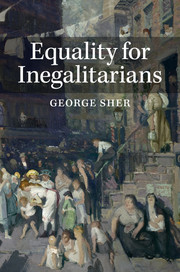Book contents
- Frontmatter
- Contents
- Preface
- Chapter 1 Reconciling equality and choice
- Chapter 2 Luck as the absence of control
- Chapter 3 Equality, responsibility, desert
- Chapter 4 The monistic turn
- Chapter 5 Why we are moral equals
- Chapter 6 Completing the turn
- Chapter 7 Coping with contingency
- Chapter 8 Enough is enough
- Chapter 9 From sufficiency to equality
- Bibliography
- Index
- References
Chapter 2 - Luck as the absence of control
Published online by Cambridge University Press: 05 August 2014
- Frontmatter
- Contents
- Preface
- Chapter 1 Reconciling equality and choice
- Chapter 2 Luck as the absence of control
- Chapter 3 Equality, responsibility, desert
- Chapter 4 The monistic turn
- Chapter 5 Why we are moral equals
- Chapter 6 Completing the turn
- Chapter 7 Coping with contingency
- Chapter 8 Enough is enough
- Chapter 9 From sufficiency to equality
- Bibliography
- Index
- References
Summary
Why, exactly, should inequalities that are due to luck be thought to be less defensible than ones that are not? This is the central question that luck egalitarianism raises, and it has both an analytical and a normative dimension. The question is partly analytical because we cannot answer it without offering a more precise specification of the feature that separates the two classes of inequalities, but it is partly normative because it also requires an explanation of that feature's moral importance. In this chapter and the next, I will discuss the three most plausible sets of answers to the central question. Because each set invokes the relevant normative consideration only to justify those inequalities that display the cited feature, but not to make the case for equality in its absence, each justification of luck egalitarianism that emerges will be pluralistic. By coming to understand why each such justification fails, we will begin the monistic turn that will ultimately propel us beyond luck egalitarianism.
I
At first glance, the task of giving content to the luck egalitarian's central distinction may not seem particularly difficult; for when luck egalitarians summarize their position, they tend to do so in strikingly similar terms. To characterize the inequalities that they are willing to accept – the ones that are not matters of luck – they standardly describe them as inequalities for which the parties are responsible. Along these lines, we often encounter assertions such as the following:
What seems bad is not that people should be unequal in advantages or disadvantages generally, but that they should be unequal in the advantages and disadvantages for which they are not responsible.
[The purpose of egalitarianism] is to eliminate involuntary disadvantage, by which I (stipulatively) mean disadvantages for which the sufferer cannot be held responsible, since it does not appropriately reflect choices that he has made or is making or would make.
In the ideal luck egalitarian society, there are no inequalities in people's life prospects except those that arise through processes of voluntary choice or faulty conduct, for which the agents involved can reasonably be held responsible.
- Type
- Chapter
- Information
- Equality for Inegalitarians , pp. 20 - 34Publisher: Cambridge University PressPrint publication year: 2014



